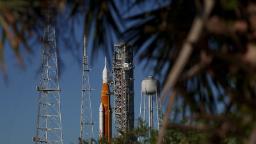
Sign up for CNN’s Wonder Theory science newsletter. Explore the universe with news on fascinating discoveries, scientific advancements and more.
CNN
—
The Artemis I rocket will not have its third launch attempt on Tuesday as planned due to concerns over Tropical Storm Ian making its way toward Cuba and Florida.
After meeting on Saturday morning, NASA’s Artemis team decided to forgo the September 27 launch opportunity and is now preparing the mega moon rocket stack for rollback.
“On Tuesday, Tropical Storm Ian is forecast to be moving north through the eastern Gulf of Mexico as a hurricane, just off the southwest coast of Florida. A cold front will also be draped across northern Florida pushing south,” said CNN Meteorologist Haley Brink.
“The combination of these weather factors will allow for increased rain chances across much of the Florida peninsula on Tuesday, including the Cape Canaveral area. Showers and thunderstorms are forecast to be numerous and widespread across the region. Tropical storm-force winds from Ian could also arrive as early as Tuesday night across central Florida.”
Meanwhile, the Space Launch System rocket and Orion spacecraft continue to sit on the launchpad at Kennedy Space Center in Florida.
Team members continue to monitor the weather as they make a decision about when to roll the rocket stack back into the Vehicle Assembly Building at Kennedy. NASA will receive information from the US Space Force, the National Hurricane Center and the National Oceanic and Atmospheric Administration to inform their decision.
Engineers have deferred their final decision about when to roll back as they gather additional data and analysis. Should the team decide to roll back the rocket inside the building, that process would begin late Sunday night or early Monday.
The preparations can shorten the typically three-day process it takes to roll the spacecraft back inside. And once the vehicle is rolling on the slow moving crawler transport, it can take 10 hours or more.
The rocket stack can remain at the pad and withstand winds up to 85 miles per hour (74.1 knots). If the stack needs to roll back into the building, it can handle sustained winds less than 46 miles per hour (40 knots).
On Friday, the Artemis team said that October 2 was a backup launch date. But it’s unlikely that a new launch date will be set until the rollback decision has been made.
“The agency is taking a step-wise approach to its decision making process to allow the agency to protect its employees by completing a safe roll in time for them to address the needs of their families while also protecting for the option to press ahead with another launch opportunity in the current window if weather predictions improve,” according to a NASA release.
Concerns over the weather system forming in the Caribbean put the weather conditions at only 20% favorable for a launch, according to a forecast released by the US Space Force on Friday.
Constraints on the launch require that the Artemis I mission does not fly through any precipitation. The launch constraints are designed to avoid natural and rocket-triggered lightning strikes to in-flight rockets, which could cause damage to the rocket and endanger public safety, according to the Space Force.
Rocket-triggered lightning forms when a large rocket flies through a strong enough atmospheric electric field, so a cloud that is not producing natural lightning could still cause rocket-triggered lightning, according to the Space Force.




